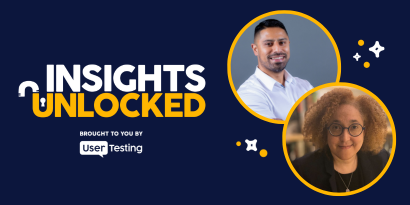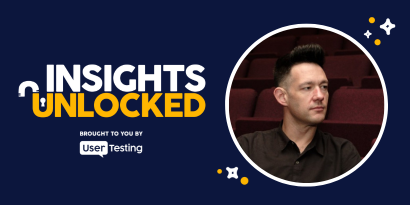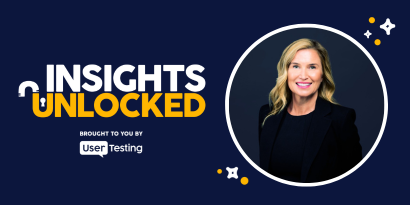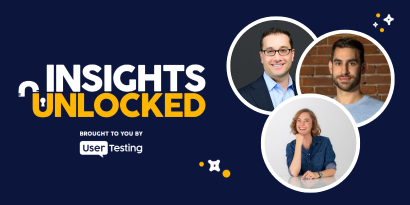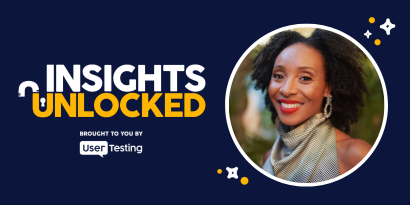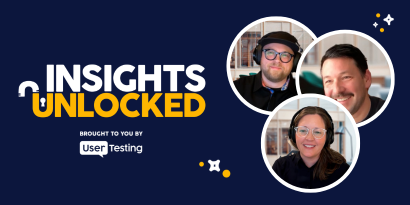
Episode 13 | April 26, 2021
Creating a framework for customer listening with Dan Storms from CookUnity
Explore Dan Storms' journey from engineer to Chief Product Officer at CookUnity. Learn product management insights, customer empathy, and growth strategies.
Creating a framework for customer listening with Dan Storms from CookUnity
"Why are we building these things? What impact is it going to make?" These were the questions Dan Storms, Chief Product Officer at CookUnity, kept asking during his early career as an engineer. His curiosity eventually led him down the path to product management—a journey that would shape his career and define his approach to building consumer-focused products.
In a recent episode of Insights Unlocked, Dan shared valuable insights into product management, customer empathy, and how CookUnity is revolutionizing the food delivery industry. His story is not just about career growth but about understanding the deep connection between products and the people who use them.
Building CookUnity: A Marketplace with a Difference
When the pandemic hit in early 2020, many companies rushed to capitalize on the sudden surge in demand for food delivery services. But CookUnity took a different approach. "We really focused on our core value to customers," Dan explained. This focus on value, rather than growth for growth's sake, helped CookUnity carve out a unique position in the competitive food delivery market.
"Our model from the consumer side is a subscription-based service where you sign up for weekly deliveries. What really sets us apart is the high quality of the food and the variety we offer." — Dan Storms
CookUnity isn’t just another food delivery service—it's the first chef-to-consumer platform that connects talented chefs with food lovers to create an elevated at-home dining experience. Dan describes it as a "managed marketplace," where the company controls the experience more tightly than traditional marketplaces. "We take orders in advance, order all the ingredients together, and distribute them to the chefs. This model has proven super effective."

The Power of Customer-Centric Design
One of the key themes Dan emphasized is the importance of understanding your customers deeply. At CookUnity, this understanding is built through a combination of qualitative and quantitative research. The company conducts regular customer interviews and structured surveys to gather insights that drive product development.
"We layer on a combination of qualitative and quantitative research," Dan noted. One particularly effective tool is the Customer Discovery survey, which helped the team identify a demand for more Mediterranean dishes. This led to the onboarding of a top Israeli chef, which immediately resonated with customers.
This focus on customer feedback has tangible results. By refining the sign-up process to better capture customer preferences, CookUnity saw a 50% lift in conversion rates. "We were able to draw a straight line from the learnings to this outcome," Dan shared.
"Our best customers didn't talk about sustainability or healthiness as much as they talked about high quality and variety. That’s where we decided to focus." — Dan Storms
Leading with Empathy and Strategic Positioning
Dan's journey is also a lesson in the power of empathy and strategic positioning. His transition from engineering to product management was driven by a desire to understand not just how things are built, but why. This mindset has been crucial in shaping CookUnity’s success.
Strategic positioning is another area where Dan has honed his skills. By identifying the core attributes that resonate most with CookUnity’s raving fans—such as high-quality food and great variety—the company has been able to fine-tune its market positioning and messaging.
"We presented this to the company, updated our marketing, and saw real outcomes," Dan explained. The results speak for themselves, with increased conversion rates and notable press coverage that brought in more of their best-fit customers.
The Future of Personalized Experiences
Looking ahead, Dan is excited about the potential for creating highly personalized customer experiences at scale. "In a few years, I think many products will feel as personalized as something like Spotify’s Discover Weekly," he said. This level of personalization, driven by deep customer insights and advanced technologies like machine learning, could become the norm across industries.
At CookUnity, the goal is to make every customer’s experience feel uniquely tailored to their tastes and preferences. "We hope CookUnity will be part of that movement," Dan added.
"Our goal is to create a personalized experience at scale—where every meal feels uniquely tailored to our customers' tastes and preferences." — Dan Storms
Conclusion: Lessons for Product Managers
Dan Storms' insights offer valuable lessons for product managers and anyone involved in creating customer-driven products. His story underscores the importance of empathy, strategic positioning, and a relentless focus on delivering value to customers. As CookUnity continues to grow and innovate, it serves as a compelling example of how to succeed in a highly competitive market by truly understanding and serving your customers.
Episode Links
- Dan Storms on LinkedIn
- Customer Empathy: The New Metric for Success
This article discusses the importance of building a customer-centric business through empathy, which is a key theme in the podcast where Dan Storms talks about understanding customers deeply and creating value. - The Power of Fast Experimentation for Product Managers
This article highlights the importance of incorporating continuous experimentation in product management, echoing the podcast's discussion on iterative development and refining products based on user feedback. - The Impact of Scaling Empathy and How We Do It at UserTesting
This piece explores how companies can scale empathy across their organization, a concept that aligns with Dan’s emphasis on customer empathy and personalized experiences in the podcast. - Empathy Map: A Guide for Better Digital Experiences
This guide provides a framework for creating empathy maps, which help teams synthesize user feedback effectively—connecting directly with the podcast’s focus on understanding customer needs through research and feedback loops.

